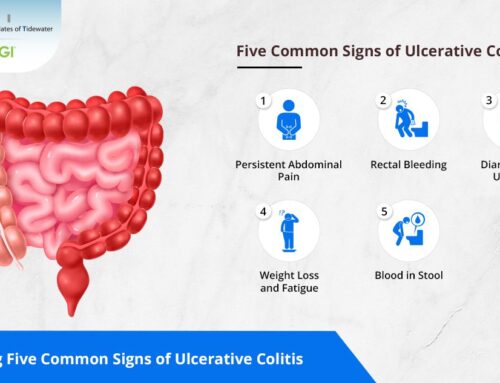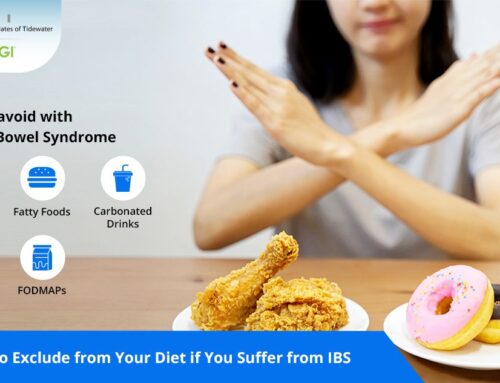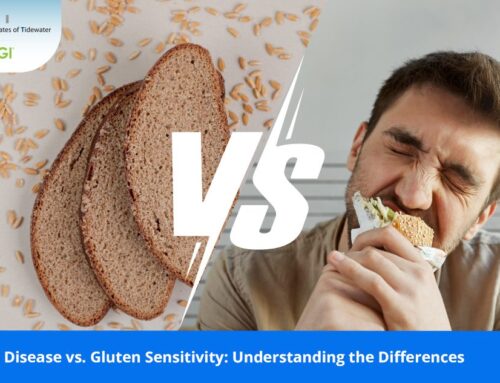Ulcerative colitis is an inflammatory bowel disease (IBD) that causes long-lasting inflammation and ulcers in the digestive tract. It primarily affects the innermost lining of the colon and rectum, leading to persistent discomfort and complications.
Recognizing the symptoms of ulcerative colitis is the first step toward getting effective treatment. Here are five typical symptoms of ulcerative colitis:
1. Abdominal Pain
One of the principal symptoms of ulcerative colitis is abdominal pain, typically in the lower left region. This pain often comes in waves coinciding with bowel movements. The inflammation of the colon causes this discomfort and, in severe cases, may even lead to abdominal distension.
2. Diarrhea
Another significant symptom is the frequent occurrence of diarrhea, often with blood or pus. Ulcerative colitis causes inflammation and sores in the colon, leading to this unpleasant symptom. The persistent diarrhea can also result in dehydration, so it’s critical to drink plenty of fluids.
3. Urgency to Use the Bathroom
Individuals with ulcerative colitis frequently experience a strong urge to use the bathroom for bowel movements, even when their bowels are already empty. This condition, called tenesmus, can lead to prolonged periods in the bathroom and disrupt daily activities.
4. Fatigue
Fatigue or feeling excessively tired is a common but often overlooked symptom of ulcerative colitis. This is due to the body’s energy being diverted to fighting inflammation, coupled with the loss of nutrients from frequent bowel movements.
5. Weight Loss
Unintentional weight loss can be a symptom of ulcerative colitis. This can occur due to loss of appetite, or from the body not absorbing enough nutrients due to inflammation in the colon.
Ulcerative colitis can present with other symptoms, including fever, joint pain, and skin rashes. Fever is usually associated with severe or extensive disease and may indicate complications such as abscesses or severe inflammation. Joint pain and swelling can make everyday activities uncomfortable.
Additionally, some individuals with ulcerative colitis may experience skin rashes, appearing as red, tender bumps. These rashes are a result of the immune system’s response to inflammation in the body. Recognizing these symptoms is crucial for timely management and treatment of ulcerative colitis.
If you identify with one or more of these symptoms, it’s essential to consult a gastroenterologist as soon as possible. Early detection and treatment of ulcerative colitis can alleviate symptoms and potentially lead to long-term remission. Remember, each individual’s experience with ulcerative colitis can vary greatly, so comprehensive medical evaluation is necessary for an accurate diagnosis and effective treatment plan.
If ulcerative colitis goes untreated, it can lead to serious complications such as:
- Developing colon cancer due to the long-term inflammation of the colon.
- Toxic megacolon, where the colon experiences rapid swelling and inflammation that spreads into the deeper layers of the colon and causes a perforated colon or a hole in the colon.
- Severe dehydration
- Liver disease
- Osteoporosis
- Inflammation of the skin, joints, and eyes
- Deep vein thrombosis (blood clots in veins)
Seeking the expertise of a gastroenterologist is crucial for the effective treatment of ulcerative colitis, as they can provide a specialized treatment plan tailored to your condition’s severity and your individual health needs.
Treatment Options for Ulcerative Colitis
Ulcerative colitis treatment options vary based on disease severity, location, patient health, and preferences. Medications like anti-inflammatory drugs, corticosteroids, and immune system suppressors can reduce inflammation.
Biologics targeting specific immune proteins are also effective. In severe cases, surgery may be necessary, involving the removal of the colon and rectum followed by the creation of a j-pouch.
Dietary modifications like a high-calorie diet, reducing high-fiber foods and maintaining fluid intake help control symptoms. Complementary therapies like probiotics and fish oil supplements offer potential relief. Consult a healthcare provider before starting any new treatments.
Remember, the goal of treatment is not only to alleviate symptoms but also to promote long-term healing of the colon and prevent complications. Regular check-ups and open communication with your healthcare provider are key components of successful ulcerative colitis management.
For more information or to schedule an appointment, contact Gastroenterology Associates of Tidewater at (757) 547-0798.






